Project Management
/Contracts
Contracts
The Contracts module is the foundation of every project. No project begins without an agreement, and here all client contracts live in one place - no spreadsheets, no scattered files. Each signed contract flows directly into the rest of the system: tasks, invoices, payments, and even time tracking stay connected automatically.
Whether it’s a simple one-off deal or a complex multi-month service agreement, contracts ensure that projects start on solid ground and that every next step - from billing to project delivery - follows smoothly.
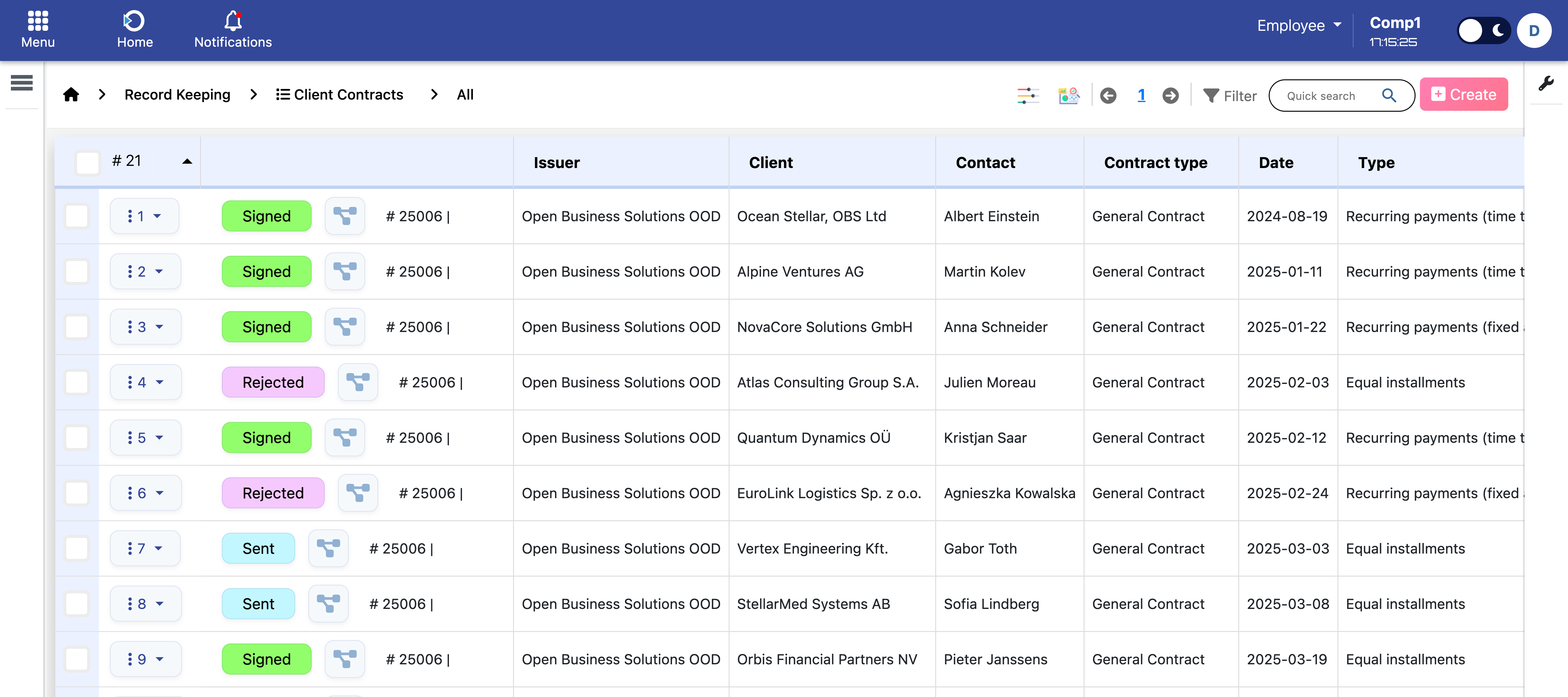
Location: Home screen > Client Contracts
Contract Lifecycle
Every contract moves through a clear workflow, so you always know its status at a glance:
- Draft - Start the contract and enter key details. Nothing is visible to the client yet.
- Data validation - Use this stage to double-check the information before sending. It's a checkpoint for your team to confirm details. (Automation tools can be added if needed, but by default, this step is manual.)
- Sent - Share the contract with the client for review.
- Signed - Once the client approves, the contract becomes active, and connected modules (like invoicing or time tracking) start working.
- Rejected - If the client declines, the contract closes with this status.
This simple flow ensures everyone - managers, finance, and project teams - sees exactly where the contract stands.
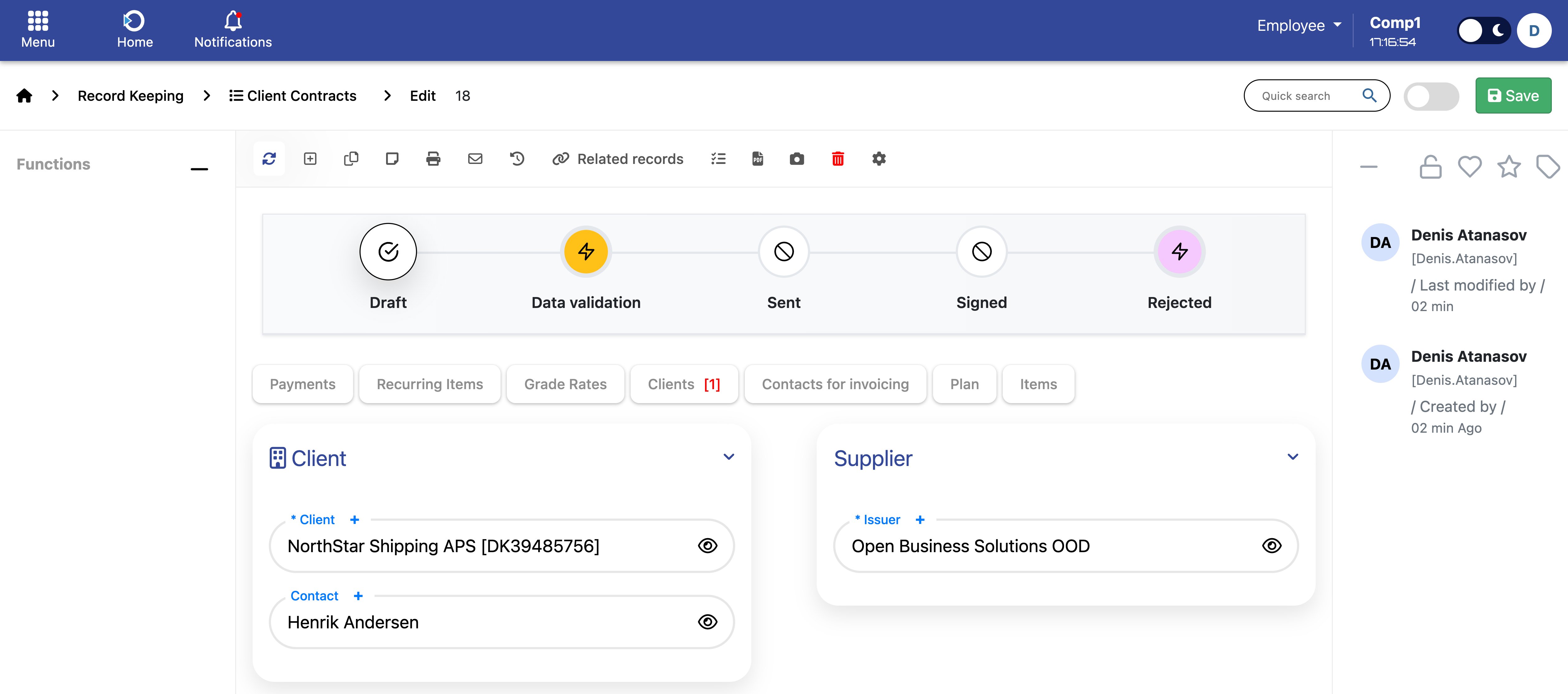
Location: Home screen > Client Contracts
Contract Types
When you create a new contract, the first choice is its type. This defines how the contract will handle payments and invoicing. There are three main options:
1. Equal Installments
Use this when the client pays a total amount, split evenly across several months. The system automatically generates the full payment schedule based on:
- Total amount
- Number of payments
- First payment date
- (Optional) Advance payment
Best for: tuition fees, leasing contracts, long-term loans.
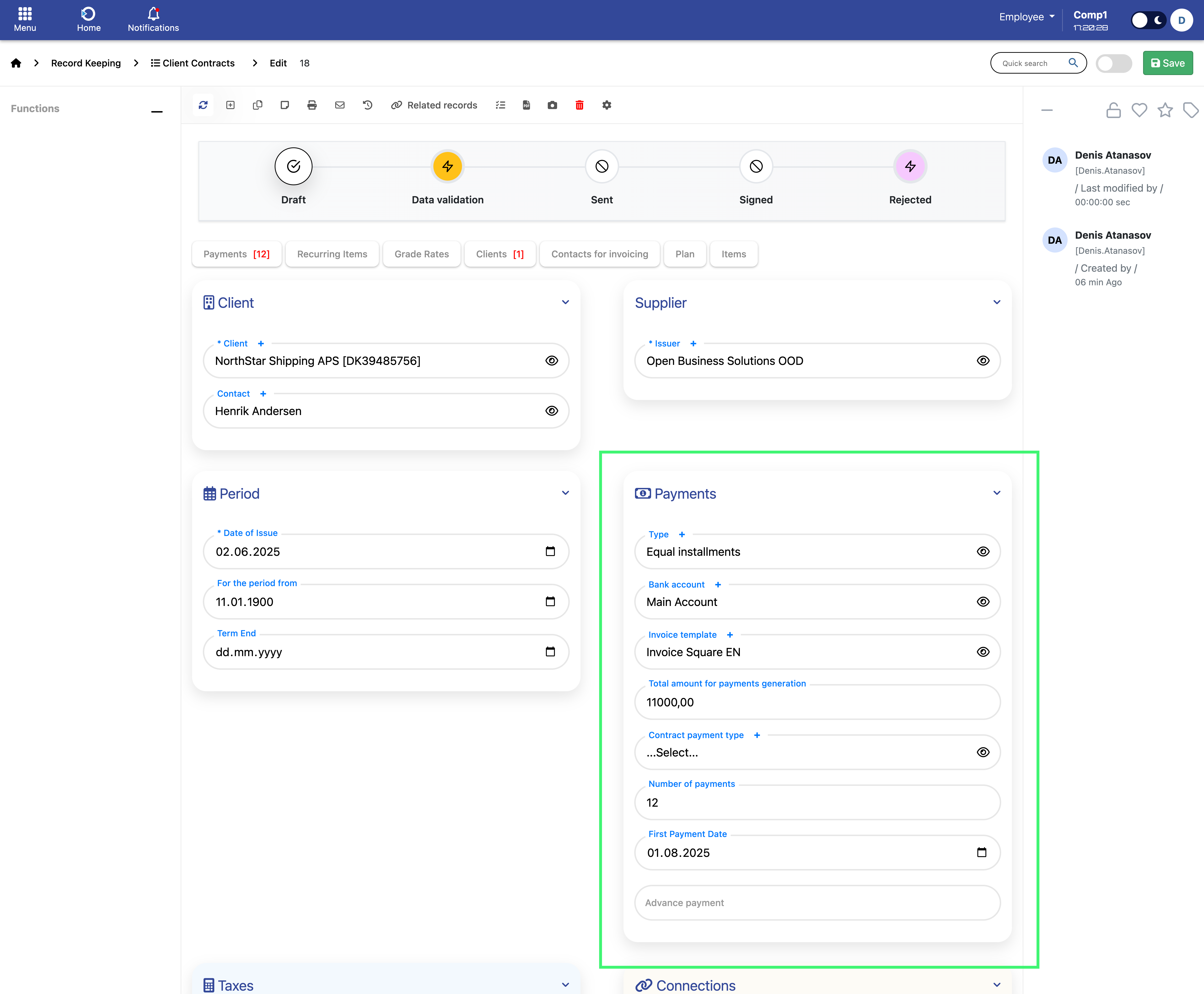
Location: Home screen > Client Contracts
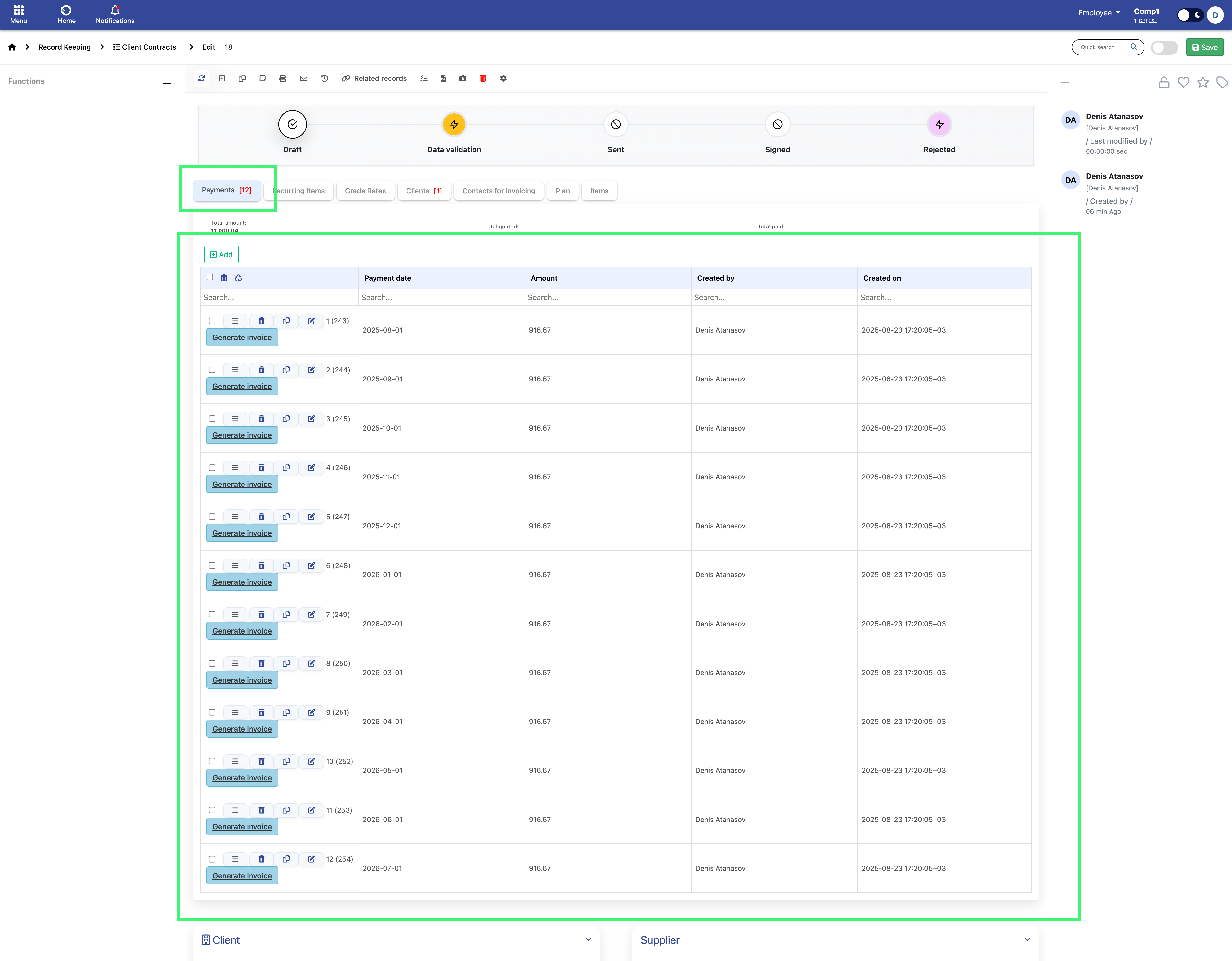
Location: Home screen > Client Contracts > Payments
2. Recurring Payments (Fixed Amount)
Choose this when the client pays a fixed recurring fee at regular intervals (usually monthly). You define the services and amounts in the Recurring Items tab, and the system will generate invoices accordingly.
Best for: service retainers, hosting packages, software support subscriptions.
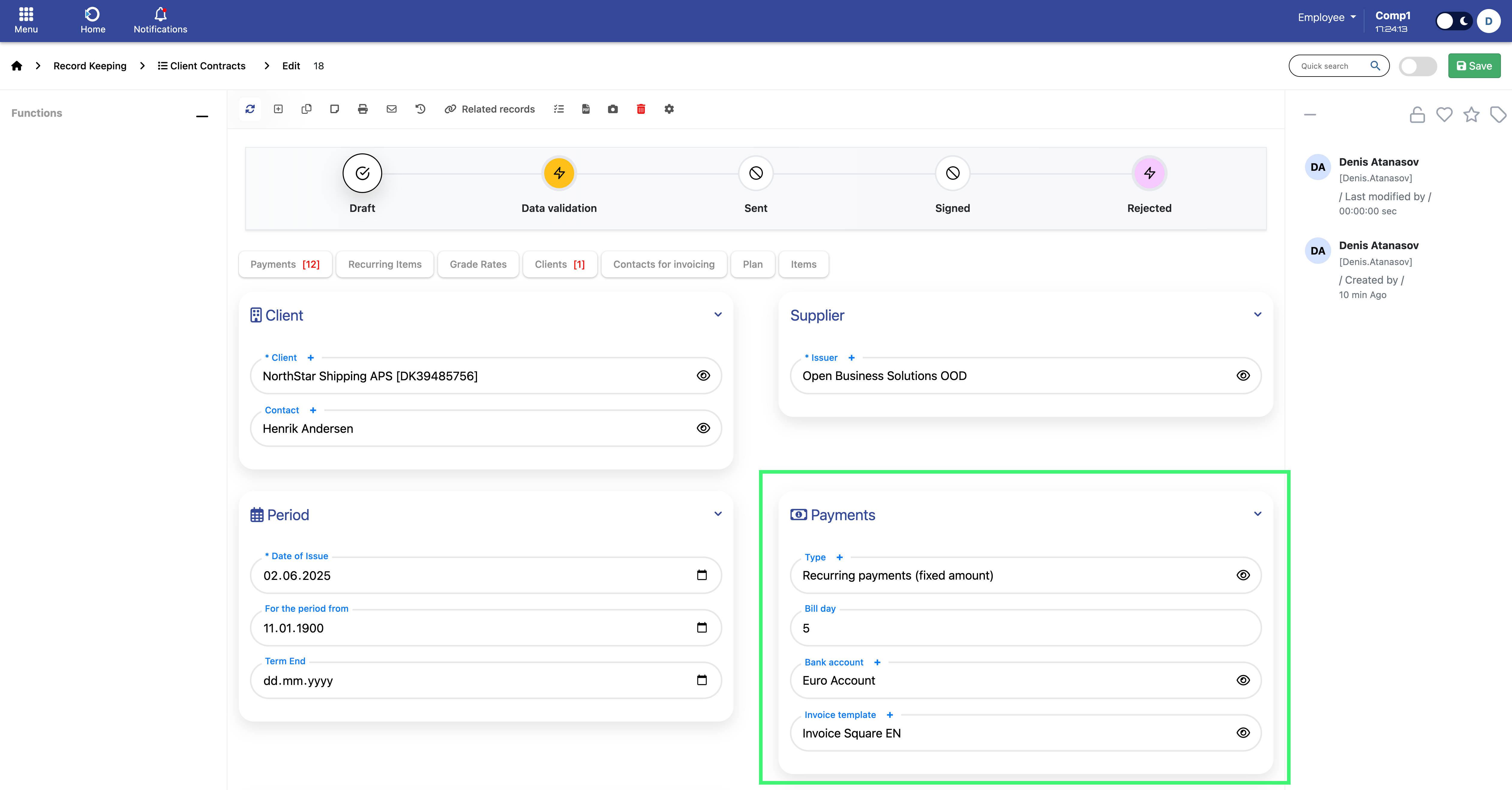
Location: Home screen > Client Contracts
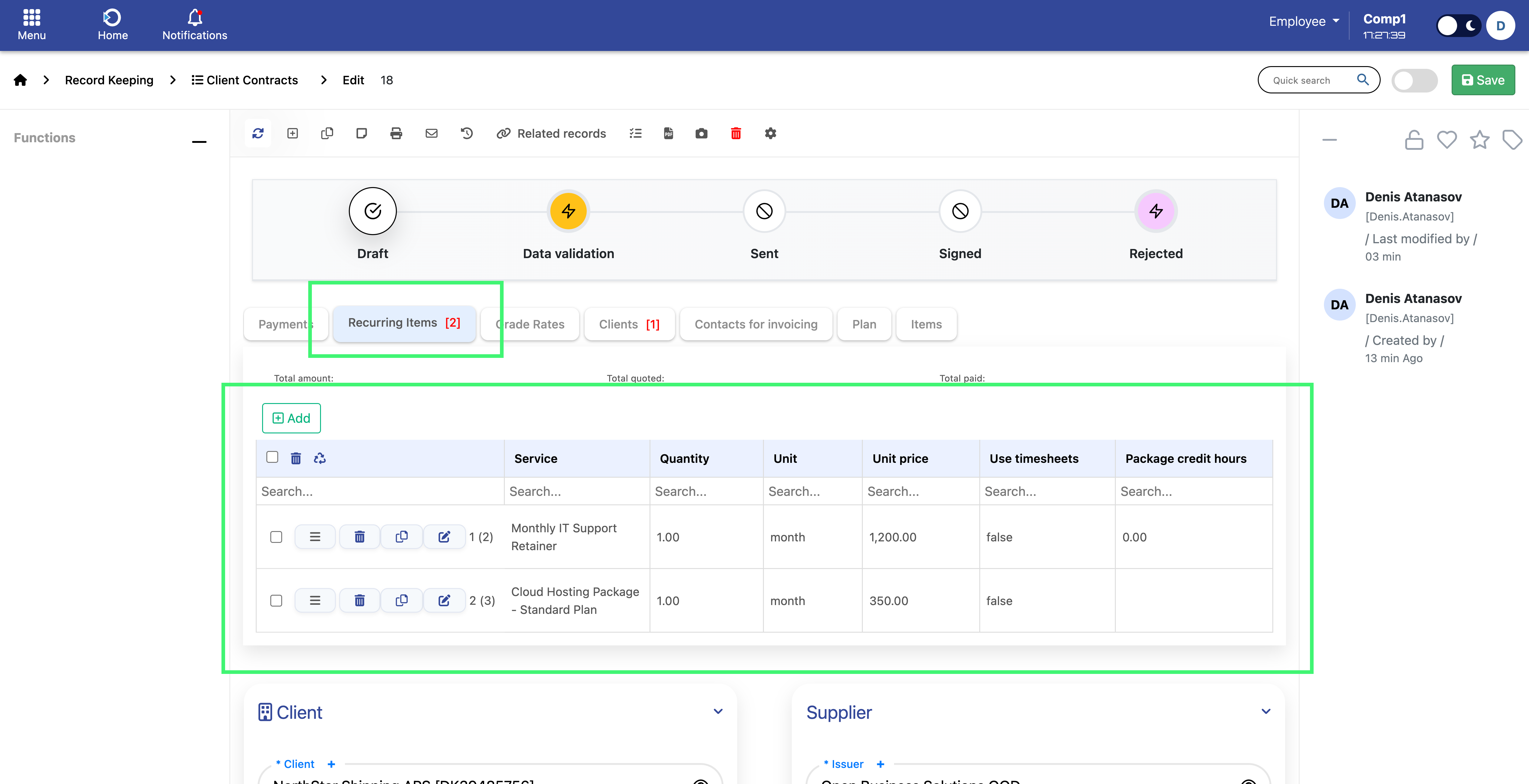
Location: Home screen > Client Contracts > Recurring Items
3. Recurring Payments (Time Tracking)
This type connects directly with the Time Tracking module.
Invoices are based on the actual hours tracked by employees working on tasks under the project linked to the contract.
When you select Recurring Payments (Time Tracking) in a contract, you’ll see a few extra fields compared to the “Fixed Amount” option:
- Workday Start / End – here you define the official working hours.
This matters because the system automatically classifies any tracked time outside these hours as off-hours, which can be billed at a different rate.
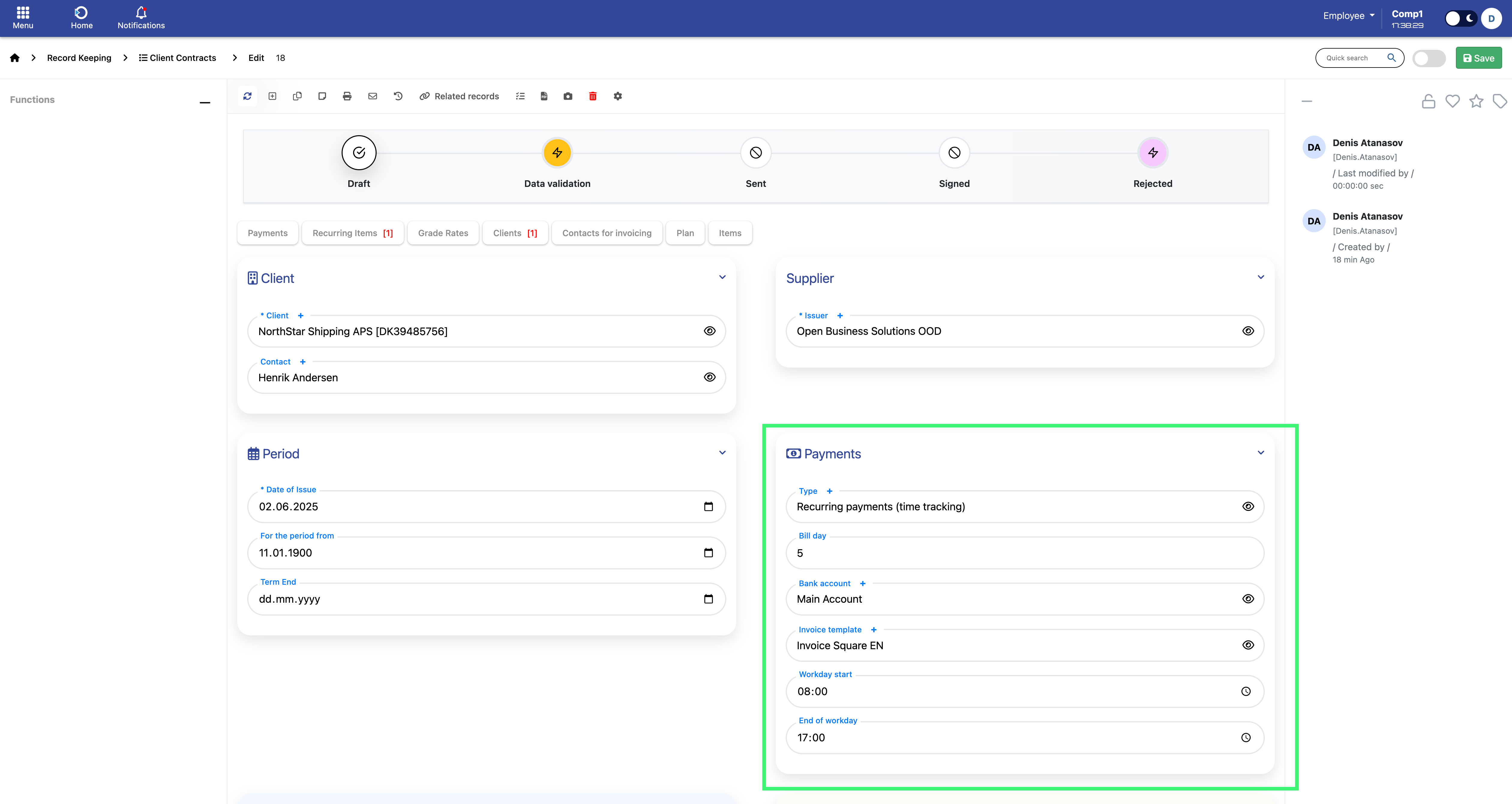
Location: Home screen > Client Contracts
It supports advanced scenarios such as:
- Package hours – a predefined bundle of included hours per month.
- On-call hours – hours worked outside the defined workday, nights, weekends, or public holidays.
- Extra hours – additional time tracked once the package is exceeded.
- Grade-based pricing – different rates depending on employee seniority/role.
Best for: IT support agreements, consulting contracts, or any project where billing depends on actual tracked hours.

Location: Home screen > Client Contracts > Recurring Items
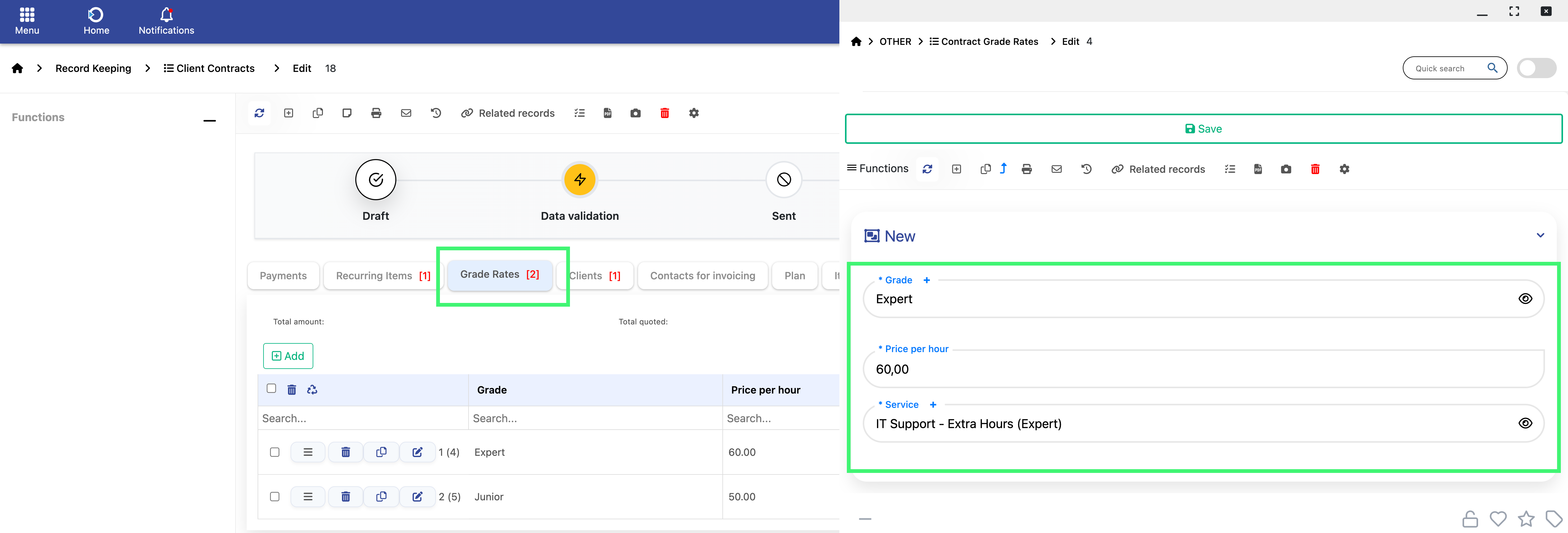
Location: Home screen > Client Contracts > Grade Rates
By selecting the right type, you ensure the system handles billing automatically and in line with your business model.
Submodules and Tabs
Under each contract you'll find tabs that group the related details. Use them to finish the setup and keep everything in one place.
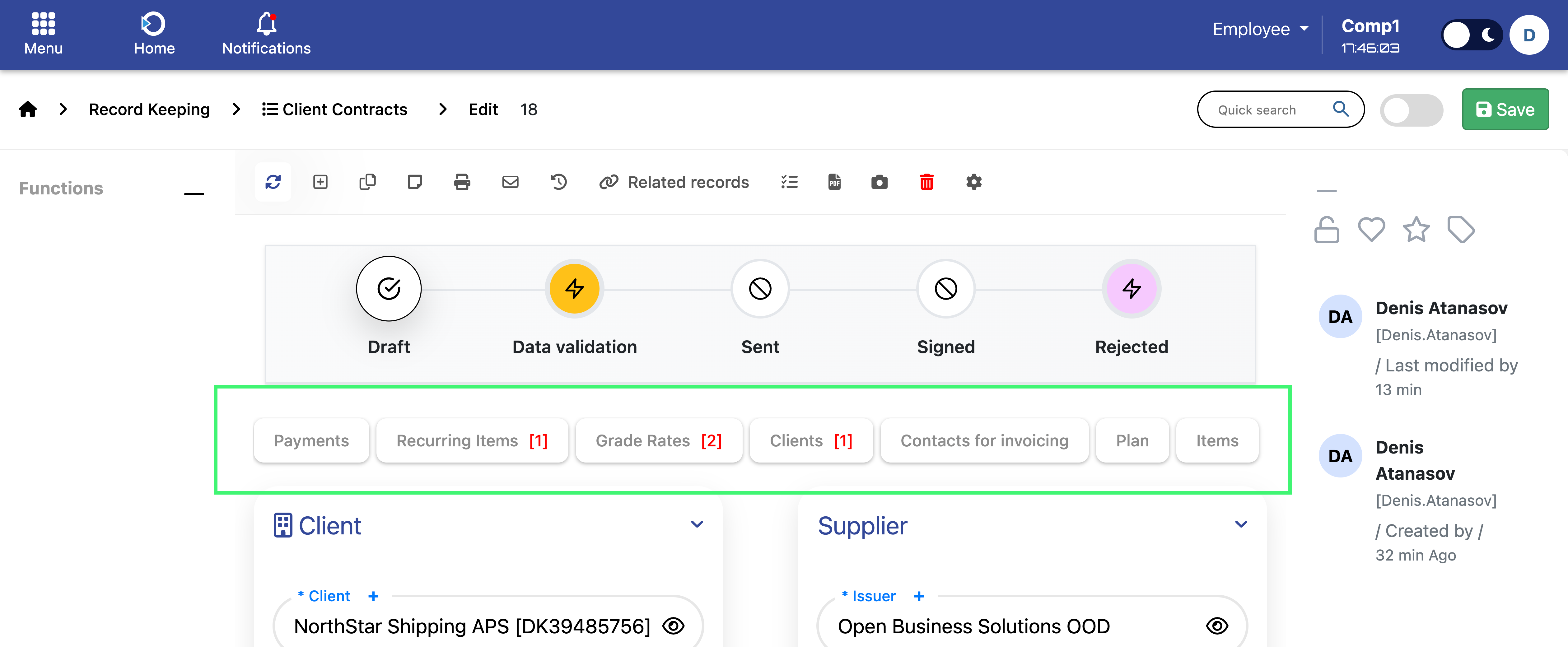
Payments
Use this tab to see or build a payment schedule.
- Equal Installments: the system can auto‑generate the full plan (based on total amount, number of payments, first payment date, optional advance).
- Recurring types: this tab is usually not needed; monthly invoices come from Recurring Items instead.
Actions:
- Review the list of scheduled payments and due dates.
- (Optional) enable a scheduler to auto‑create invoices for upcoming payments.
Recurring Items
Define the monthly billable lines that will appear on invoices.
- Fixed Amount contracts: list the services, quantity, unit, and price per unit.
- Time Tracking contracts: add the package and off‑hours rules here.
Key fields:
- Service, Qty, Unit, Price per unit - one invoice line per row.
- Use timesheets (toggle): when ON, more fields appear:
- Package credit hours (e.g., 10h included monthly)
- Offhours service
- Offhours price per unit
Tip: For time‑tracking contracts, keep exactly one "Use timesheets" row that holds the package/off‑hours configuration, and add any other fixed monthly fees as separate rows (with the toggle OFF).
Grade Rates
Set hourly rates per staff grade (used when the package is exceeded).
- Relevant for Time Tracking contracts.
- The system will allocate extra daytime hours by grade and use the configured service and price per unit from here.
Key fields:
- Grade
- Service
- Price per unit
Clients
Attach one or more client companies to the contract.
- The primary client is added automatically when you create the contract.
- Use this tab if the agreement involves multiple parties (e.g., umbrella contracts, billing on behalf of).
Contacts for invoicing
Choose who receives the invoices for this contract.
- Select the billing contact(s) from the client's contacts.
- These recipients can be used by the invoice sending automation.
Plan
A read‑only overview of the installment plan.
- Visible/used mainly with Equal Installments.
- Shows the generated schedule so finance can track upcoming amounts.
Items
List of the contract services/products (for the contract document itself).
- If the contract was created from a quotation, items are copied automatically to keep wording and pricing consistent.
- Useful for generating the contract PDF/e‑signature.
What to fill first?
- Pick the contract type.
- Complete the relevant tab(s): Payments (for Equal Installments) or Recurring Items (+ Grade Rates for Time Tracking).
- Add Clients and Contacts for invoicing.
- (Optional) Review Plan and Items if you work from quotations or need a detailed contract PDF.
Generate PDF from Contract
Contracts can be turned into clean, client‑ready PDFs in a few clicks. To keep documents consistent, use predefined templates and let the system fill in the data from the record.
1. Prepare your templates (one‑time)
Create and maintain your document templates centrally. You can include merge fields (placeholders) for client, issuer, prices, items, dates, etc. Full guide here: Document Templates.
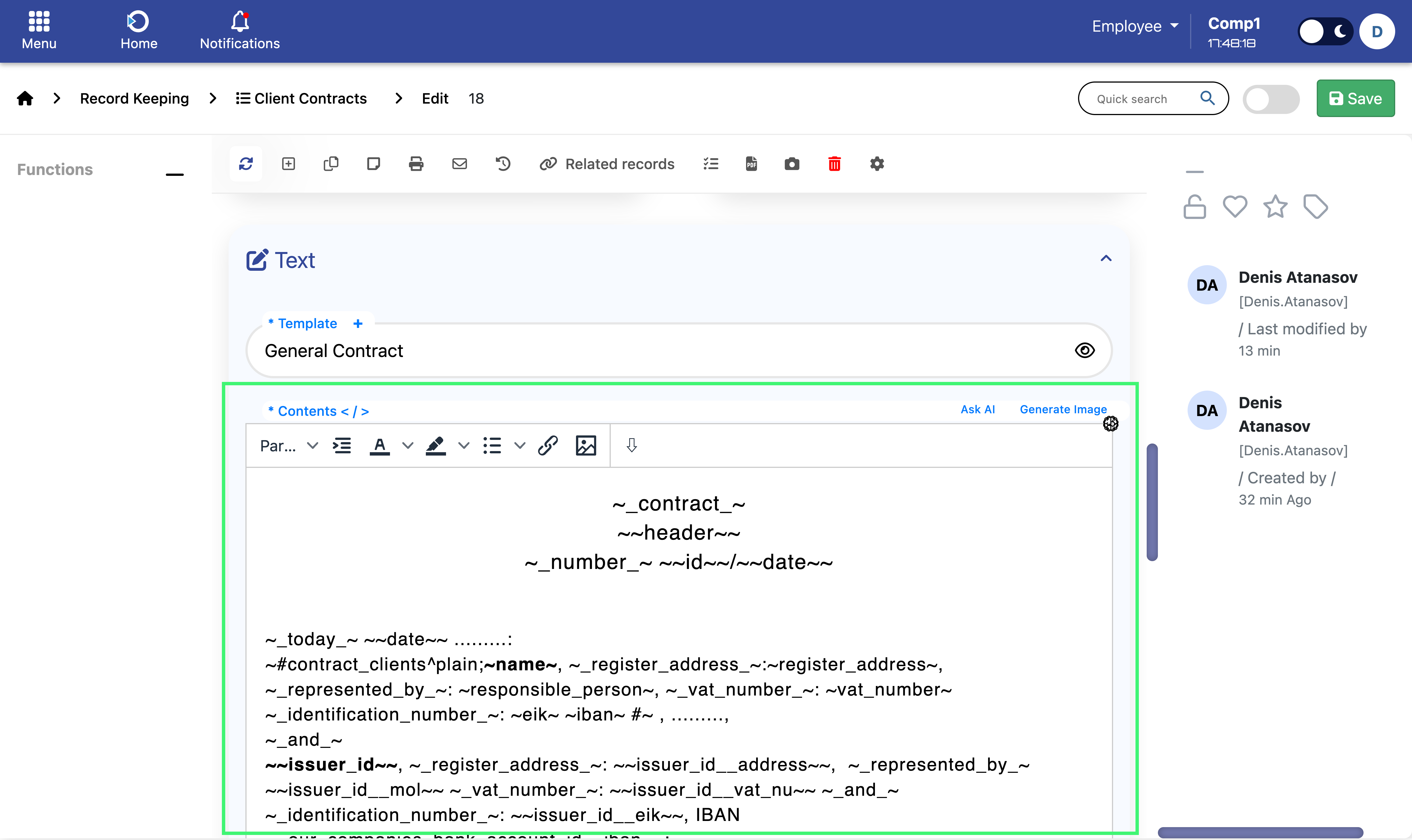
Location: Home screen > Client Contracts
2. Select a template in the contract
In the Text section of the contract, choose your template from the Template dropdown. The content loads automatically with the correct values from this contract (client details, items, totals, dates, etc.).
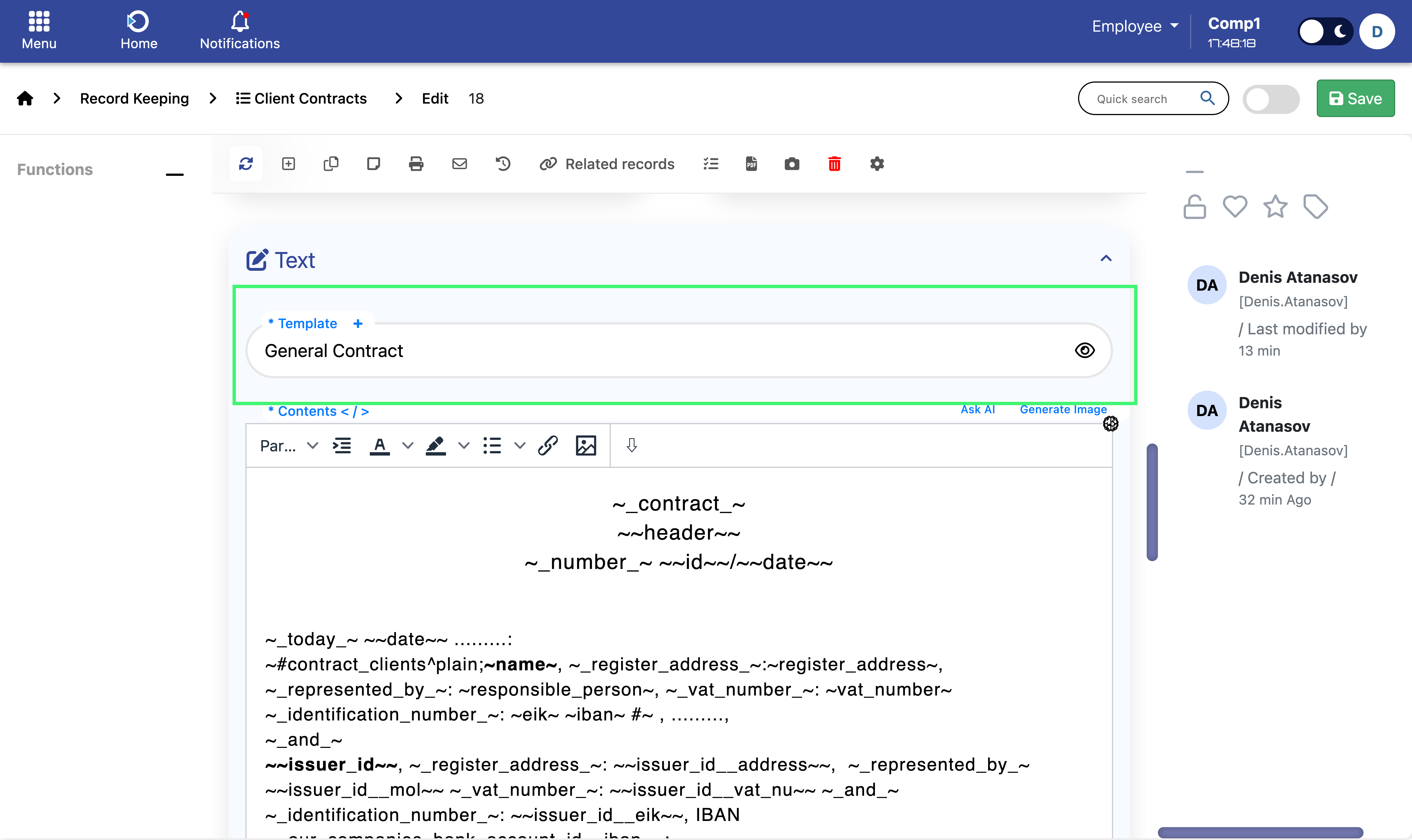
Good to know: You can safely adjust the text for this specific contract. These edits do not change the master template; they apply only to the current record.
3. Generate the document
Use the Print menu in the top toolbar. You’ll see three options:
- Preview – Quick on‑screen preview of the generated document.
- Generate PDF file – Creates a PDF you can download or send to the client.
- Generate and attach PDF file – Creates the PDF and attaches it to the contract record. This is ideal when you plan to send the contract for e‑signature (e.g., Evrotrust or another provider).
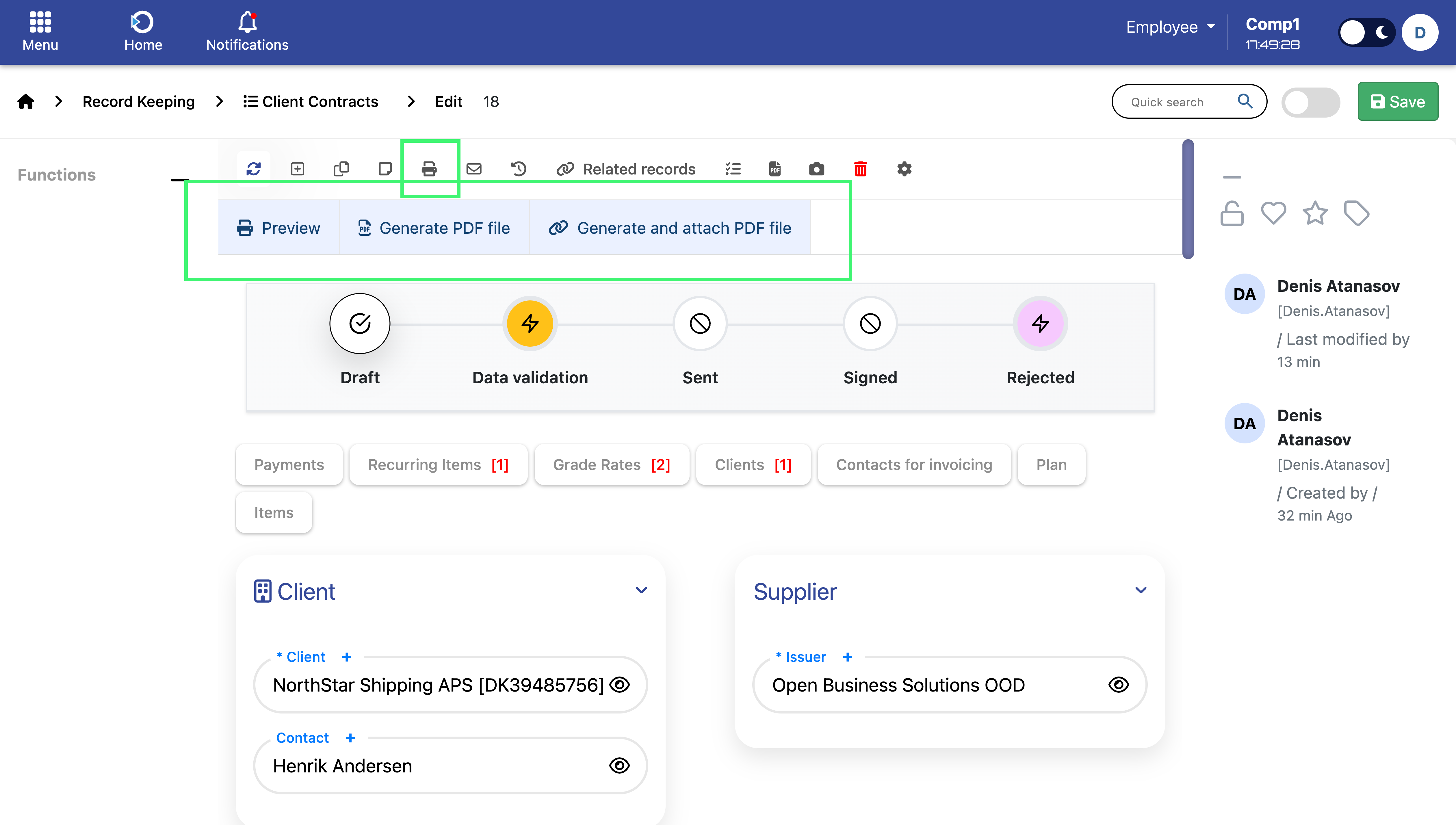
Location: Home screen > Client Contracts > Print
Tips:
- Keep templates versioned and owned by a small admin group for consistency.
- Use language‑specific templates if you work in multiple languages.
- If your contract is based on a quotation, items/wording will match automatically - no re‑typing needed.
Quotations Integration
Many contracts start as quotations. To save time and avoid mistakes, the system lets you convert a quotation directly into a contract.
When you create a contract from a quotation:
- Items & services are copied automatically into the contract.
- Milestones & schedules (if defined) are transferred to the contract plan.
- Consistency is guaranteed - what the client approved in the quotation is exactly what appears in the signed contract.
This ensures a smooth transition from sales → contract → invoicing, without duplicate data entry.
Automation
The Contracts module is built to minimize repetitive work and make sure nothing slips through the cracks.
Here's what the system does for you:
- Installments: If the contract uses equal installments, the system automatically generates the full payment plan.
- Invoices: Invoices can be created directly from the contract's schedule or recurring items - no manual entry needed.
- Timesheets: For time-based contracts, approved hours from Timesheets flow directly into the invoice.
- Package logic: The system classifies hours correctly - regular, on-call, or extra - based on the package rules you set.
This means less admin, fewer errors, and faster invoicing.
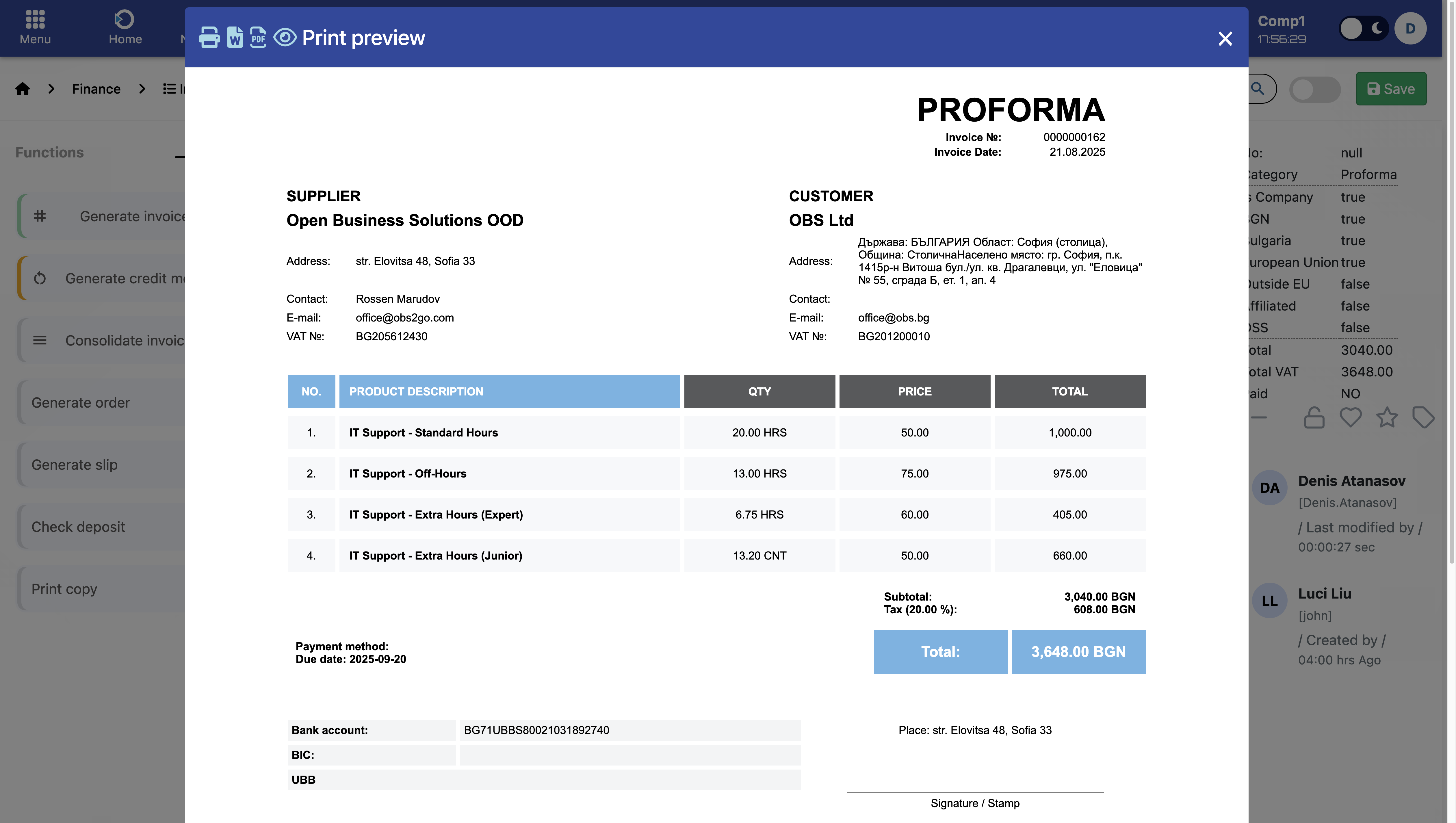
Location: Home screen > Client Contracts > Print Preview
Example Scenarios
The Contracts module is flexible enough to support many different industries and use cases. Here are some typical examples:
- IT outsourcing - A fixed monthly package of hours, with automatic billing if the package is exceeded.
- Education - Tuition fees split into equal monthly installments, managed automatically.
- Consulting - A base monthly retainer fee, with any extra work logged through Timesheets and added to the invoice.
- Leasing & finance - Agreements structured around installments, with built-in VAT handling.
Why Use Contracts?
The Contracts module gives you a reliable framework to manage agreements from start to finish. Instead of scattered spreadsheets or manual follow-ups, everything lives in one place and works together.
With Contracts, you benefit from:
- Centralized management - all client agreements organized in one module.
- Automation - payment plans, invoices, and recurring charges generated without manual effort.
- Integration - works seamlessly with Quotations and Timesheets, keeping sales and delivery aligned.
- Transparency - both your team and clients always see the current status, terms, and upcoming payments.
- Accuracy - no missed deadlines, no forgotten invoices, no manual calculation errors.
